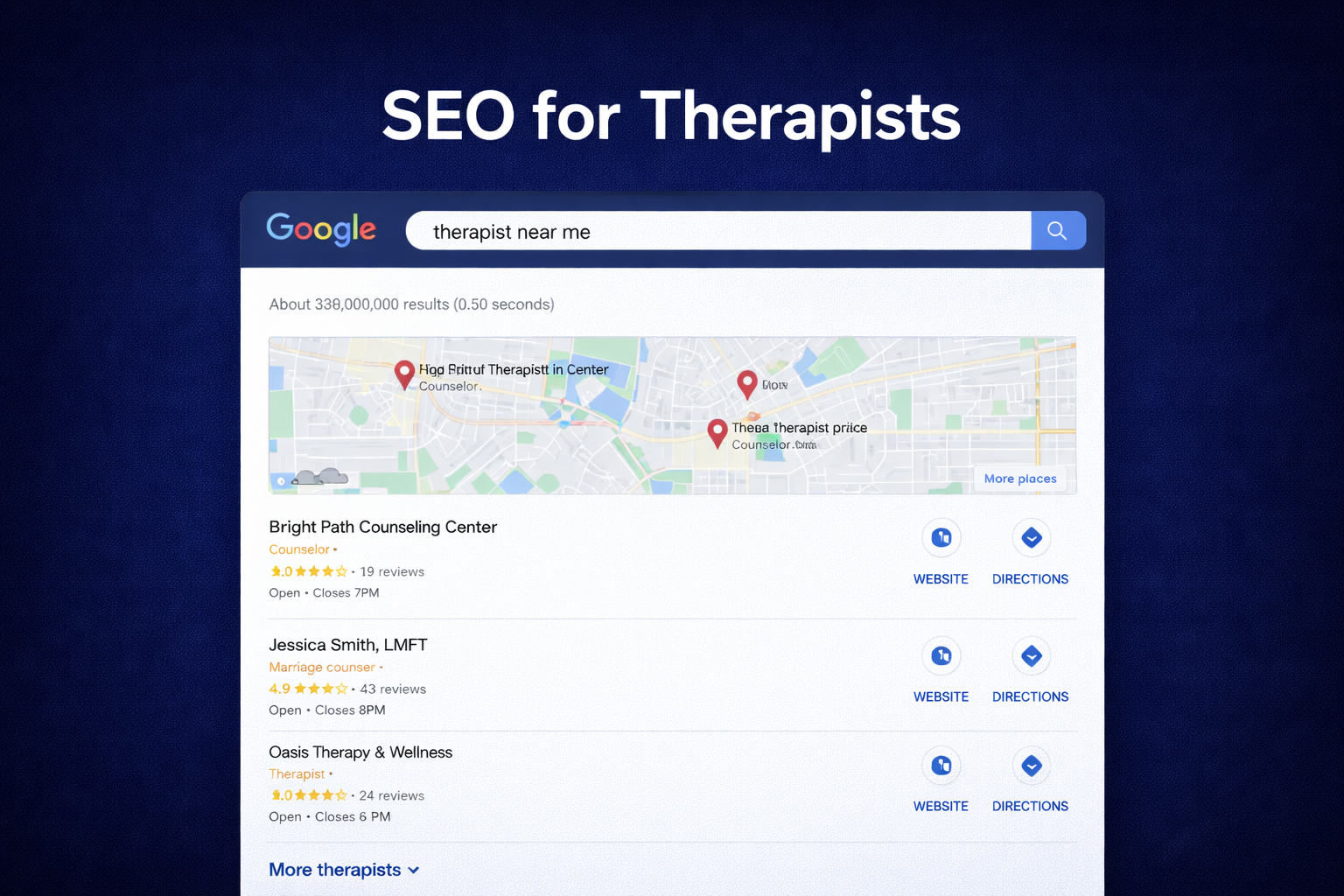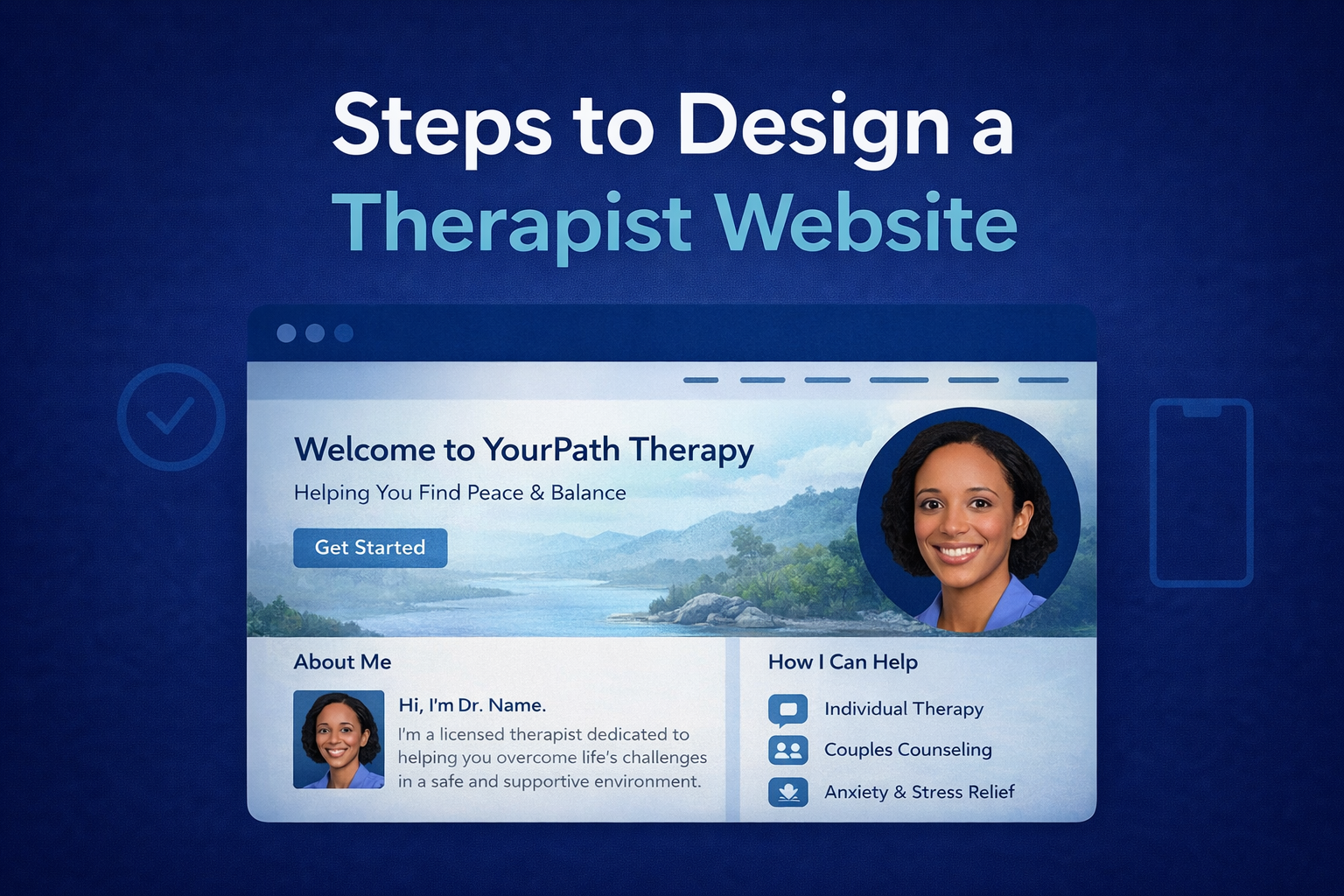SEO for therapist practices is no longer optional; it’s a core part of building a strong, trustworthy, and visible online presence. As clients increasingly turn to Google to find support for anxiety, trauma, depression, couples counseling, and other mental-health needs, therapists who do not invest in SEO risk being overshadowed by competitors with optimized websites. This includes not only content and local optimization, but also technical SEO for therapists, ensuring that websites are fast, secure, mobile-friendly, and properly structured so search engines can easily crawl and rank them.
Today’s therapy clients research symptoms, compare profiles, read blogs, and evaluate multiple providers before making an inquiry. This shift means that even highly skilled clinicians can miss out on potential clients if their website doesn’t appear in local searches or fails to communicate expertise effectively.
For therapists launching a new practice or looking to scale an established one, understanding how SEO works and how to apply it strategically creates a meaningful competitive advantage. It strengthens online reach, builds trust with potential clients, and positions your practice as an authoritative, reliable source of mental-health support.
Understanding the Importance of SEO for Therapist
Search Engine Optimization (SEO) is essential for therapist who want to be visible when clients are actively searching for support. Whether someone types “anxiety therapist near me,” “couples counseling,” or “trauma therapy online,” they expect to find providers who are credible and easy to access.
If your practice doesn’t appear in these results, you’re missing a steady stream of high-intent clients.
SEO is not just about ranking; it’s about building trust. A well-optimized therapist website looks professional, loads quickly, and answers the questions potential clients are asking. It reassures them, reduces friction, and encourages them to take the next step toward booking a session.
A fully optimized site also converts better. It guides visitors toward scheduling, contacting, or learning more, turning search traffic into actual client inquiries.
Why SEO Matters for Therapist
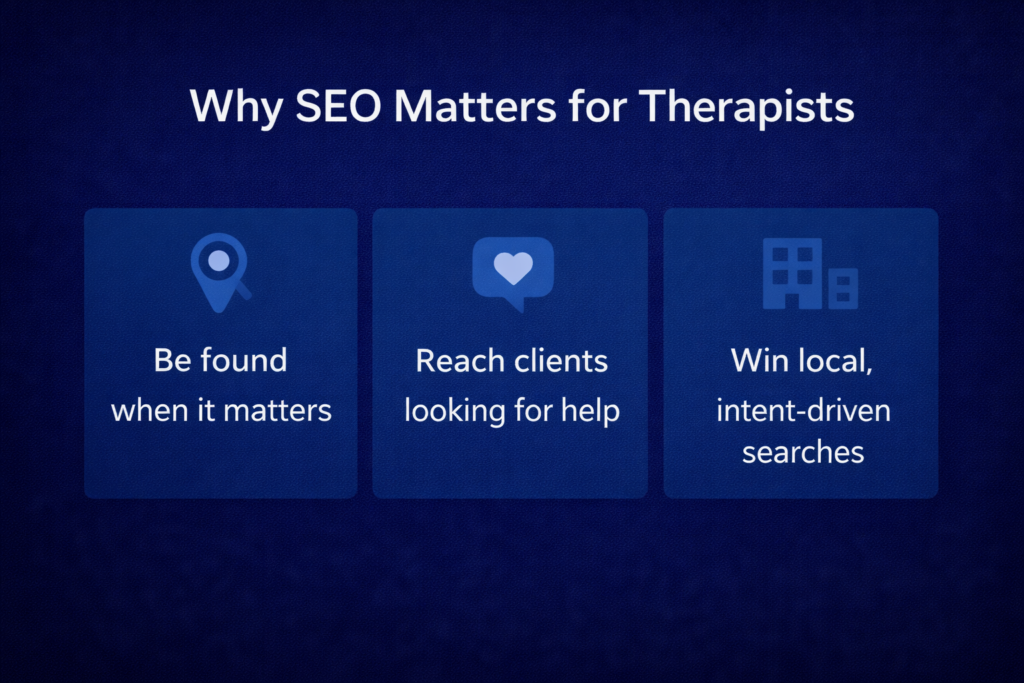
When someone searches “therapist near me” or “anxiety counseling in [city]”, they are not browsing they are actively looking for help. This is high-intent behavior. These are people who are ready to book, not just learn. SEO ensures your practice is visible at that exact moment of need.
Without search optimization, your website becomes invisible in the very place clients start their journey: Google. Even the most experienced clinicians lose opportunities simply because their practice does not appear when it matters most.
Intent-driven therapist SEO works differently from generic marketing. It is built around:
- Being found when someone is ready to take action
- Matching real search language used by clients
- Creating trust before the first session ever begins
- Turning your website into a reliable source of inquiries
Local SEO for therapists is especially powerful because therapy is personal and place-based. Most clients choose a provider within their city or neighborhood. Ranking in local results allows solo practitioners to compete with large clinics and national directories on equal ground.
SEO is not about chasing traffic. It is about meeting real people at the moment they are seeking care. Done correctly, it becomes a quiet, ethical lead generation system that works in the background supporting your practice while you focus on your clients.
How SEO Supports Long-Term Therapy Practice Growth
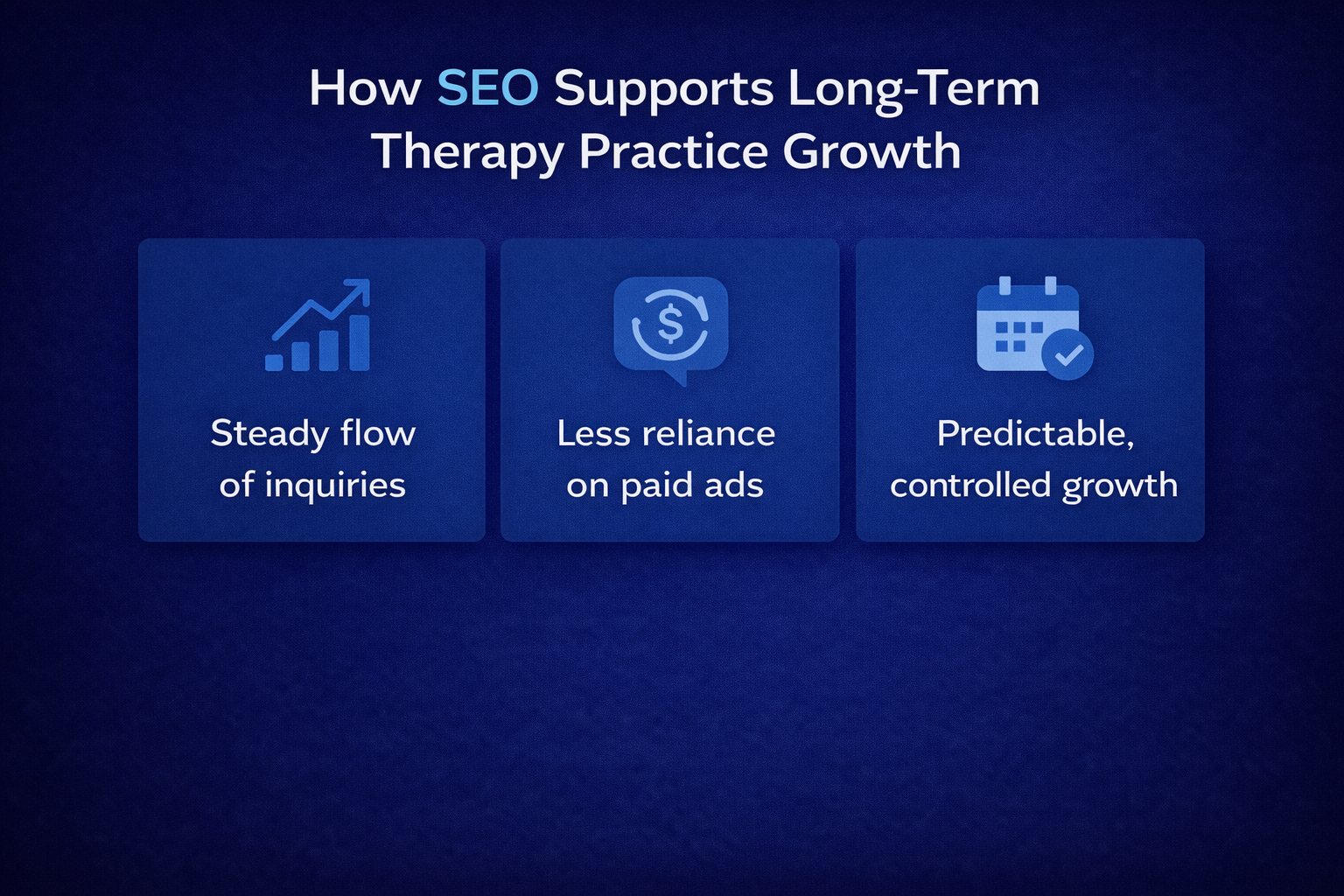
SEO builds momentum instead of spikes. It brings in clients who are already searching for help month after month without relying on ads or constant promotion. Each optimized page becomes a permanent entry point into your practice.
Because therapist SEO targets real intent (“trauma therapist near me,” “couples counseling in [city]”), the traffic you receive is qualified. These visitors are closer to booking, not just browsing.
Over time, this creates:
- A steady flow of aligned inquiries
- Reduced dependence on paid marketing
- Predictable, controlled growth
SEO doesn’t chase attention. It captures readiness. And that’s what makes it the most sustainable growth channel for a modern therapy practice.
Core Pillars of Therapist SEO
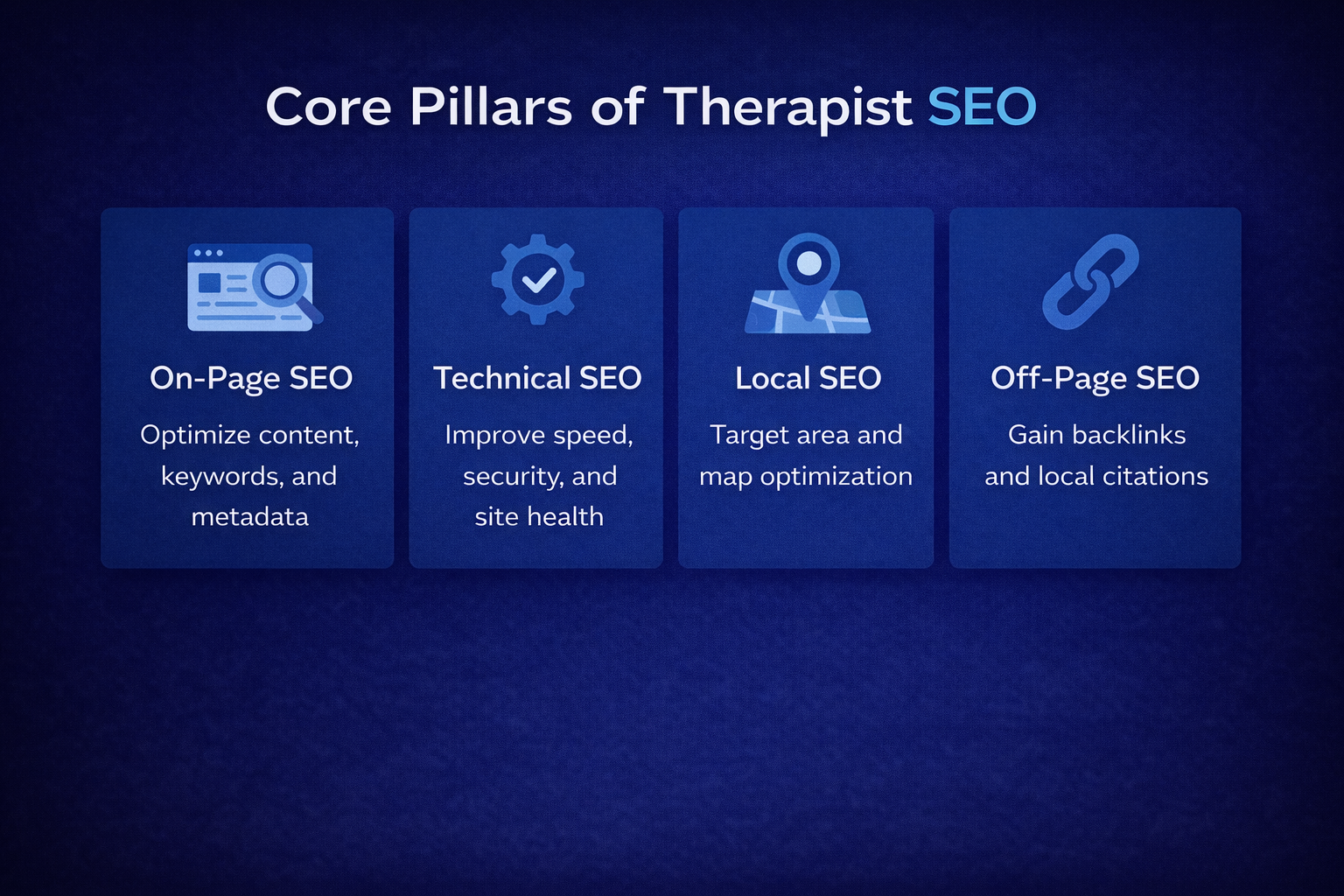
Therapist SEO is built on four essential pillars that work together to improve visibility and attract high-intent clients:
On-Page SEO – Optimizing content, keywords, metadata, and headings so Google clearly understands your services and specialties.
Technical SEO – Ensuring fast load speed, mobile responsiveness, clean structure, and secure HTTPS for a smooth, trustworthy user experience.
Local SEO – Strengthening visibility in your target area through Google Business Profile optimization, map rankings, localized keywords, and ethical reviews.
Off-Page SEO – Building authority through backlinks, directory listings, local citations, and other trust signals from reputable sources.
These pillars combine to create a strong, sustainable SEO foundation that helps therapists grow consistently over time.
On-Page SEO for Therapist
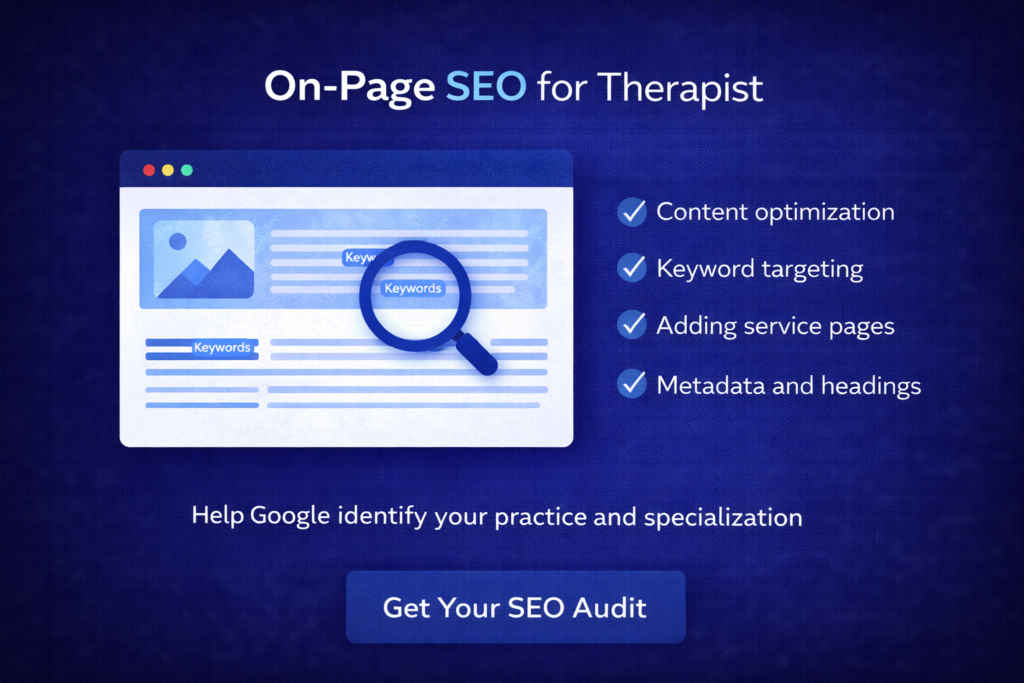
On-page SEO ensures your therapy website is understood by both search engines and real people. It tells Google exactly who you help, where you practice, and what you offer so your pages appear when someone is actively searching for care.
Strong on-page SEO focuses on clarity, intent, and structure:
- Page Titles & Meta Descriptions
Every service and location page should include your core keyword and city (e.g., “Anxiety Therapist in Denver”) with a description that invites clicks. - Clear Headings (H1–H3)
Use one strong H1 per page and structured subheadings for services, benefits, and FAQs. This improves readability and ranking. - Intent-Based Keywords
Place primary and secondary keywords naturally within the first 100 words and throughout the page. Focus on real client language not stuffing. - Service-Focused Content
Explain what you do, who it helps, and what clients can expect. Google rewards content that reflects clinical clarity and usefulness. - Local Signals
Mention your city and service area, embed Google Maps, and display your NAP details to strengthen local relevance. - Internal Links
Connect blogs to services and services to related topics. This builds topical authority and keeps visitors engaged. - Optimized Images
Use compressed images with descriptive alt text to improve speed and accessibility. - Clear CTAs
Every page should guide action: “Book a Session,” “Schedule a Consultation,” “Get in Touch.”
On-page SEO is where intent turns into action. When done right, each page becomes a direct pathway from search to session.
Technical SEO for Therapist Websites

Technical SEO ensures your website is fast, secure, and easily understood by Google. While clients focus on your expertise, search engines evaluate your site’s structure, speed, and stability to decide whether you deserve visibility.
Strong technical SEO focuses on:
- Speed – Fast-loading pages reduce drop-offs and improve rankings. Compress images, remove heavy scripts, and use an optimized theme.
- Mobile Readiness – Most therapy searches happen on phones. Your site must adapt cleanly, with simple navigation and tap-friendly buttons.
- Security (HTTPS) – An SSL certificate is essential. It builds trust, protects data, and signals clinical credibility.
- Clean Structure – Clear menus, organized services, and minimal clutter help Google index your site correctly.
- Sitemaps & Indexing – An XML sitemap submitted to Search Console ensures your pages are discovered quickly.
- Crawl Control – A proper robots.txt file keeps Google focused on your important pages.
- Schema Markup – Local Business, FAQ, and Article schema improve how your practice appears in search results.
- Ongoing Health Checks – Monitor errors, mobile usability, and Core Web Vitals to maintain ranking stability.
Technical SEO removes friction between your practice and the people searching for care. When your site is fast, secure, and structured, Google can confidently put you in front of clients who are ready to book.
Local SEO for Therapist
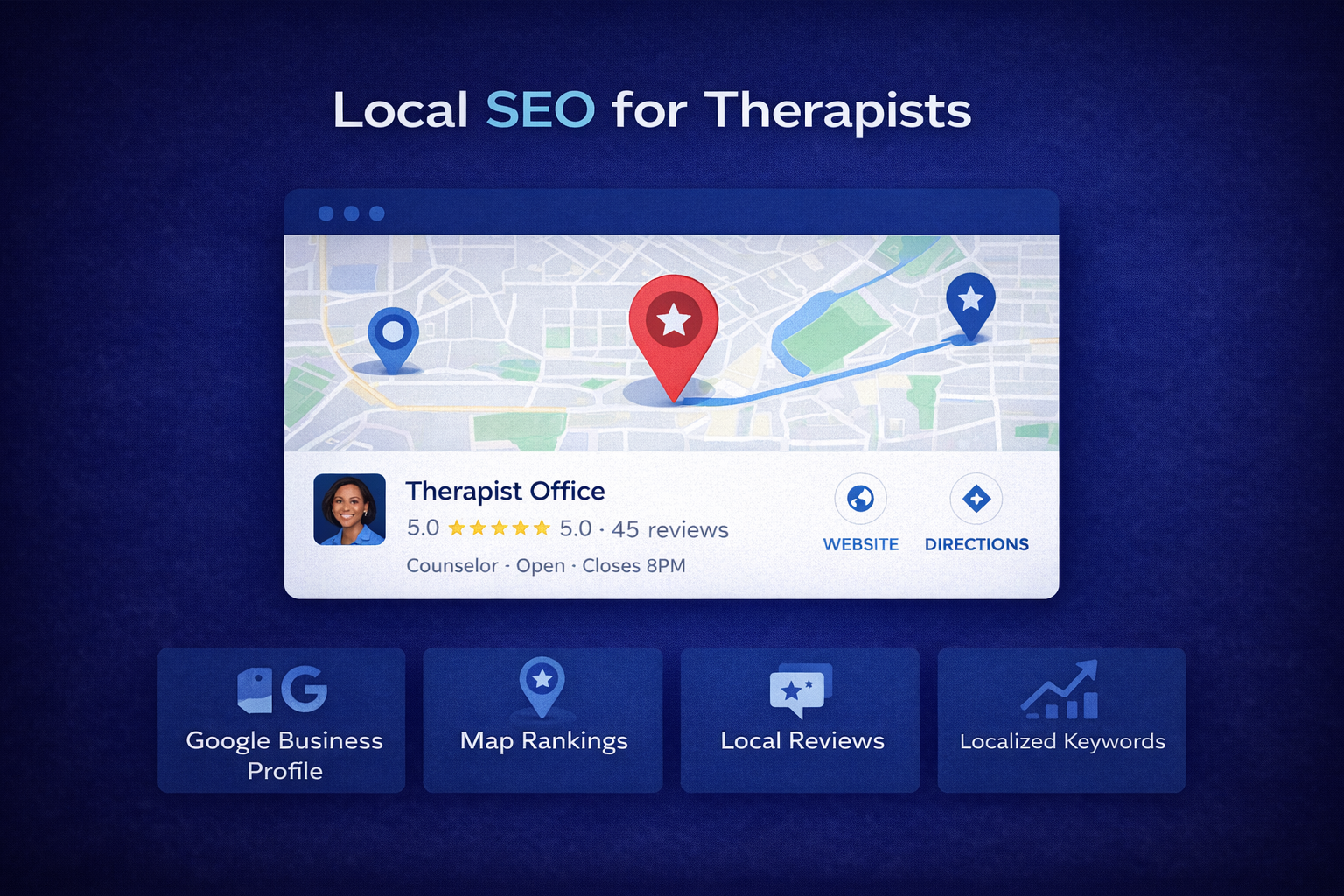
Local SEO determines whether your practice appears when someone searches “therapist near me” or “anxiety therapist in [City].” These are high-intent searches from people who are ready to reach out. If your practice is not visible locally, those clients will choose someone else.
Local SEO works because therapy is personal and place-based. Most clients prefer care within their city or state, even for teletherapy. Ranking in Google Maps and local results directly impacts how many inquiries you receive.
Effective local SEO for therapists focuses on:
- Clear, service-specific pages (anxiety, trauma, couples, etc.)
- Location keywords like “Therapist in Chicago” or “Online Therapist in Texas.”
- A fully optimized Google Business Profile
- Consistent NAP (Name, Address, Phone) across the web
- Location-based landing pages for key services
- Ethical review building and trust signals
- Local business schema for better search visibility
Content plays a major role. Localized blogs, FAQs, and guides help you rank for long-tail searches and connect with real community needs far beyond just your homepage.
Strong local SEO means:
- You appear when clients are actively searching
- Your practice feels credible before the first call
- You attract intent-driven inquiries
- You reduce reliance on directories and ads
Local SEO doesn’t chase attention. It places your practice exactly where readiness already exists.
Off-Page SEO for Therapist
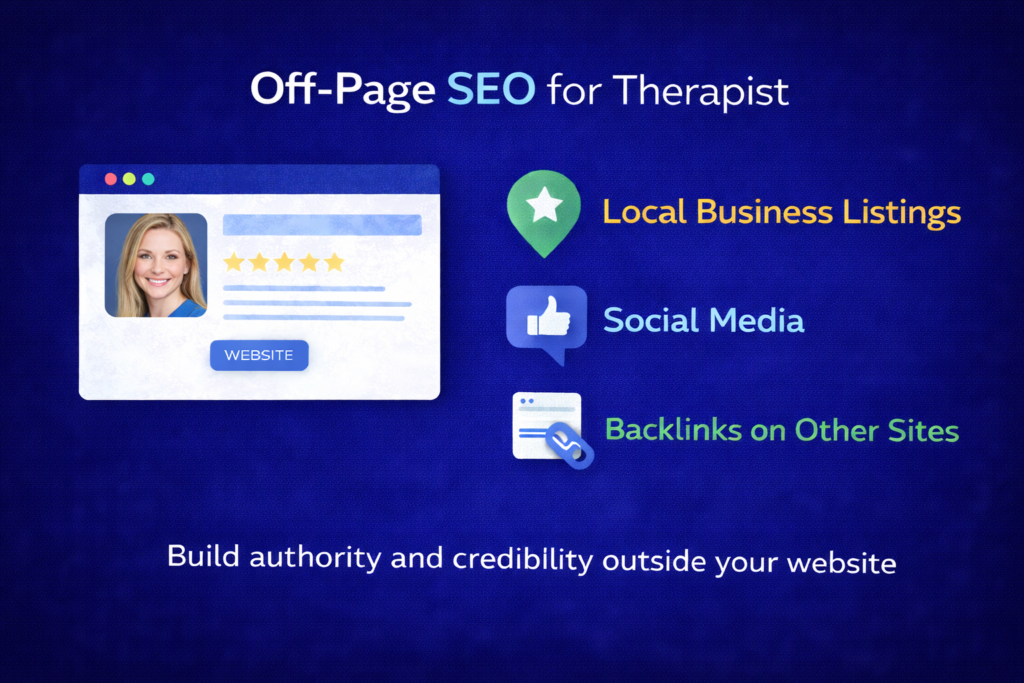
Off-page SEO builds trust outside your website. It tells Google whether your practice is credible, relevant, and respected in your field and location. While on-page SEO explains what you do, off-page SEO proves that others recognize your authority.
For therapists, effective off-page SEO focuses on:
- Authoritative Backlinks
Links from mental-health directories, professional associations, health blogs, and local media act as endorsements. A few high-quality links carry far more weight than dozens of weak ones. - Google Business Profile Strength
An optimized, active profile improves your visibility in Maps and local results. Accurate services, regular updates, and professional photos signal legitimacy. - NAP Consistency
Your Name, Address, and Phone must match across platforms like Psychology Today, TherapyDen, and GoodTherapy. Consistency builds trust with Google and clients. - Ethical Reviews
Authentic feedback is a powerful local ranking factor. Even neutral, compliant encouragement strengthens visibility and credibility. - Professional Presence
Thoughtful activity on LinkedIn or community platforms drives referral traffic and reinforces authority. - Guest Features & Partnerships
Articles, podcasts, and collaborations with local organizations generate backlinks and position you as an expert. - Brand Mentions
Being referenced—even without a link—signals trust and relevance across the web.
Off-page SEO is reputation in motion. It ensures your practice is not only found, but trusted before a client ever clicks.
Voice Search Optimization for Therapists
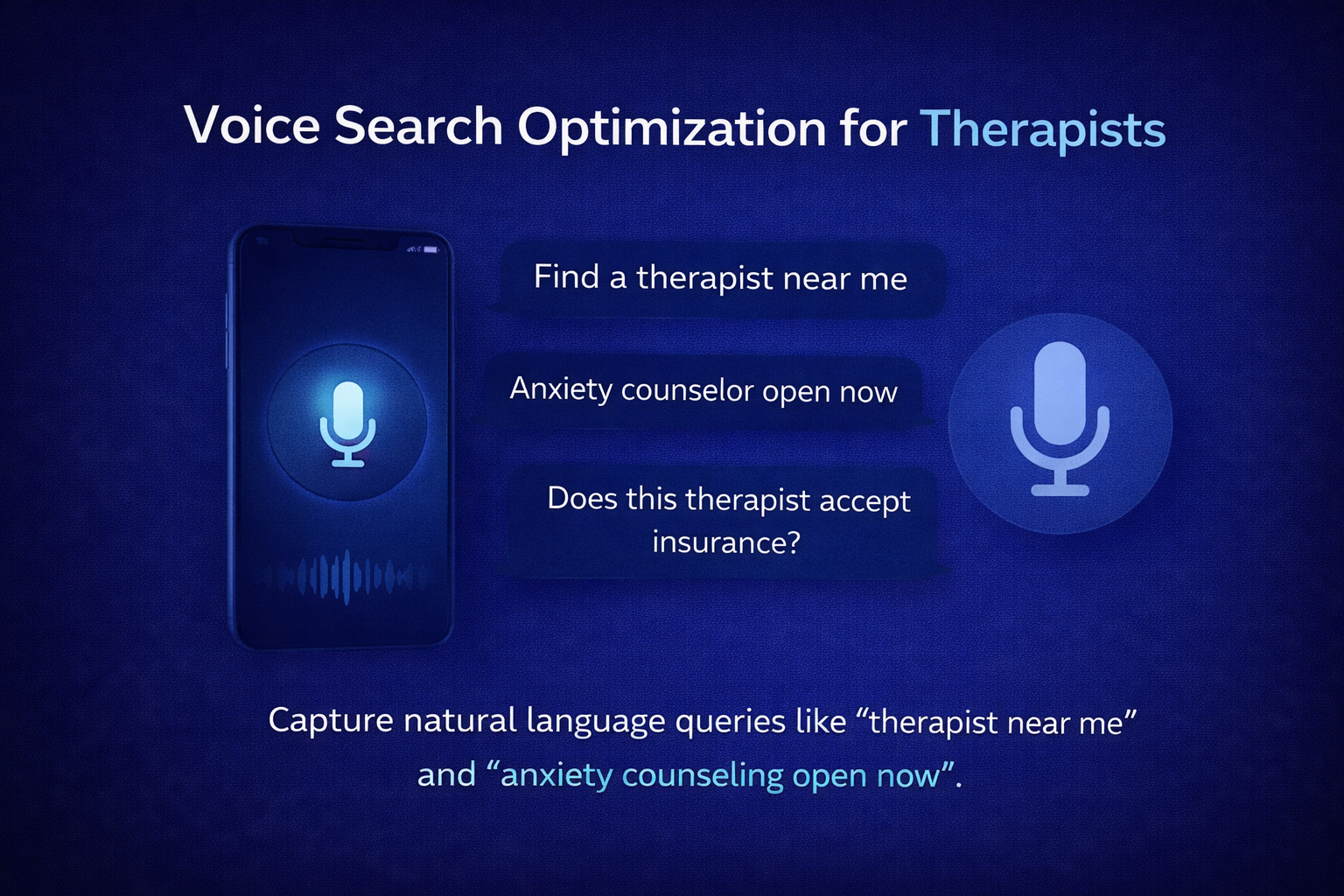
Voice search is changing how clients find therapy services. With more people using smart speakers, mobile voice assistants, and conversational queries, optimizing your practice website for voice search can significantly boost visibility and reach.
Key Strategies for Voice Search Optimization
- Use conversational, long-tail keywords such as “find a trauma therapist near me” or “best anxiety counselor in Dallas for online sessions”
- Structure your content with questions and answers (e.g., “What is CBT therapy?”) since voice searches often begin with “who,” “what,” “where,” “how”
- Ensure your website loads quickly and is mobile-friendly—voice search users expect immediate results
- Optimize your Google Business Profile and local listings to include service areas, specialties, and friendly practice descriptions, because voice searches frequently include location-based intent
- Include FAQ sections with structured data (FAQ schema) so your answers can show up directly in voice-driven search results
For a more detailed comparison of voice search versus traditional SEO and how it applies to therapy practices, see this article: Voice Search vs Traditional SEO: What Works for Therapists.
Optimizing for voice search helps your practice reach clients who are actively looking for help using natural language. By incorporating these strategies, you stay ahead of competitors and ensure your site remains relevant in today’s evolving search landscape.
How Therapists Can Use AI to Strengthen SEO
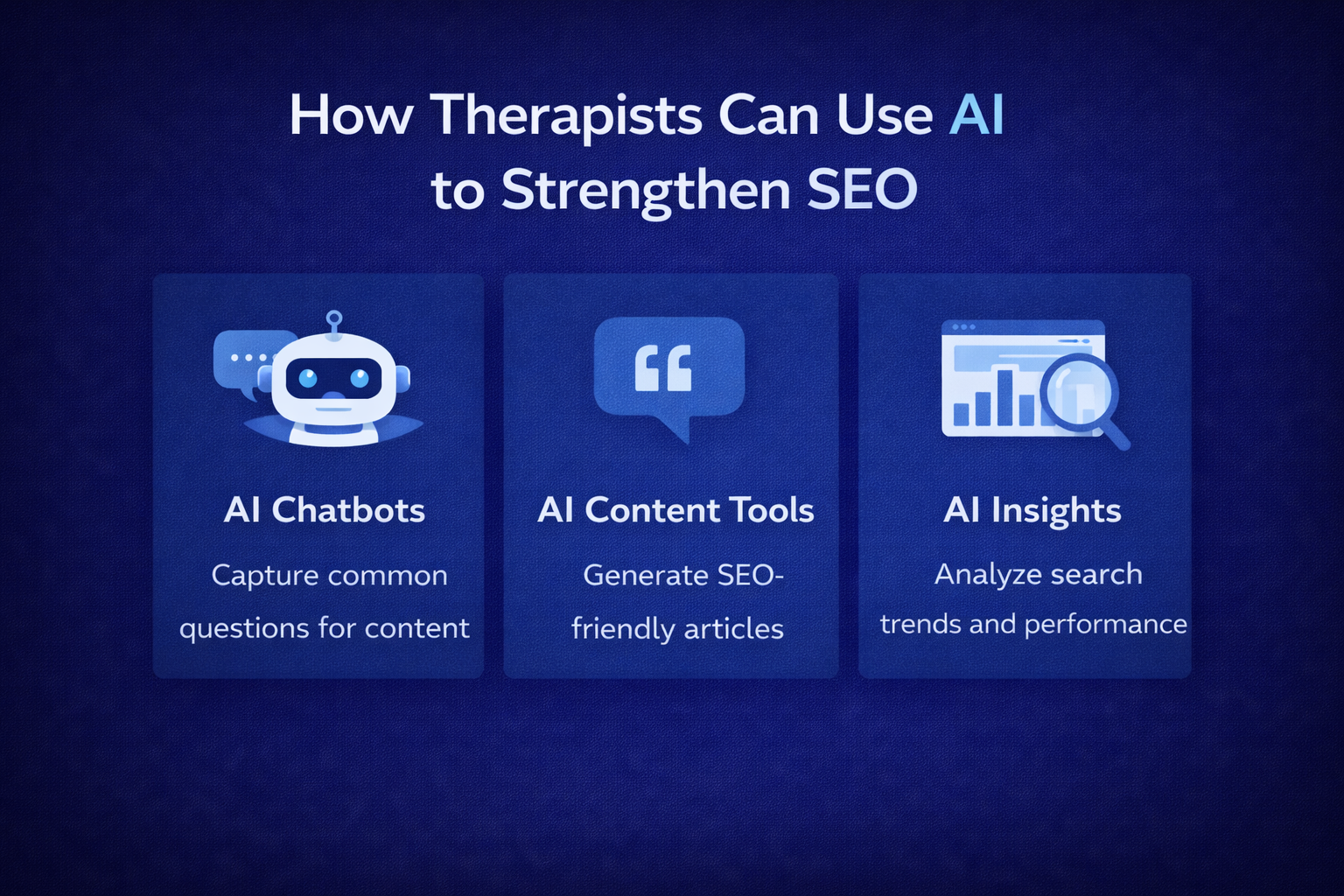
AI is no longer optional in modern therapist SEO it is a competitive advantage. Used correctly, AI tools help therapists identify real client intent, create search-aligned content, and improve visibility without spending hours on manual research or writing.
AI-powered platforms can analyze how people actually search for care. Instead of guessing keywords, therapists can target phrases clients genuinely use, such as “anxiety therapist in [City]”, “CBT for panic attacks”, or “online trauma therapy near me.” This allows your service pages and blogs to match real search behavior, not generic marketing terms.
AI also supports content that meets Google’s E-E-A-T standards. It can assist with:
- Drafting FAQs and educational pages
- Structuring blog topics around real concerns
- Expanding service pages with clarity and depth
- Maintaining consistency across your site
For local SEO, AI can help optimize Google Business Profile updates, suggest location-based topics, and identify patterns in reviews and inquiries, strengthening your presence in “near me” searches.
Advanced tools even use predictive analysis to anticipate what clients in your area will search for next, helping you stay ahead of competitors. You can explore this approach further in this guide.
AI also plays a critical role in voice search optimization. As people increasingly ask Siri or Google questions like “How do I find a trauma-informed therapist who offers online sessions?”, your content must reflect natural, conversational language.
When used ethically, AI does not replace clinical voice it amplifies it. It helps therapists work smarter, rank faster, and build a credible online presence that aligns with how people actually seek care in 2026.
How Mental Health IT Solutions Help Therapist Improve SEO
Mental Health IT Solutions is built exclusively for therapists. Every SEO strategy is shaped by how real clients search for care, how Google evaluates healthcare content, and how therapists must communicate ethically online.
MHIS helps practices rank for high-intent searches such as “anxiety therapist near me” and “EMDR therapy in [City]” by building location-specific service pages, optimizing Google Business Profiles, structuring websites for clear specialty recognition, and publishing authority-driven, compliant content. Technical performance is strengthened through speed, security, and clean site architecture.
The outcome is not just more traffic it is better inquiries. Therapists attract people who are already searching for their exact services, in their exact location. MHIS transforms a website into a reliable growth engine that connects the right clients with the right care, at the right moment.
FAQs
Why is SEO important for therapists?
SEO helps therapists appear in Google searches when clients are actively looking for support. Strong SEO improves visibility, builds trust, and ensures your practice stands out in competitive local markets.
How long does it take for therapists to see SEO results?
Most therapists begin noticing improvements in visibility, website traffic, and inquiries within 2–3 months. Significant ranking growth typically happens over 4–6 months as content, authority, and local signals strengthen.
What keywords should therapists target for better SEO?
Therapists should focus on service keywords (anxiety therapy, trauma therapy, couples counseling), local keywords (“therapist in [City]”), and condition-based terms (panic attacks, intrusive thoughts). These align with what clients most commonly search for.
Do therapists need separate pages for each service?
Yes. Creating individual service pages helps Google understand your specialties clearly. Dedicated pages for anxiety therapy, depression therapy, trauma therapy, or EMDR improve rankings and attract more targeted clients.
Is local SEO necessary for teletherapy practices?
Absolutely. Even teletherapy clients search by location. Local SEO helps your website appear for city-based and statewide searches, ensuring you reach clients in your licensed regions.
Conclusion
Every day, people in your city are searching “therapist near me” while sitting in pain, uncertainty, or crisis. They are not browsing. They are ready. The only question is whether your practice appears in that moment—or whether that opportunity goes to someone else.
SEO decides that outcome.
The right strategy ensures your work reaches the people who already need it. It turns your website into a steady source of real inquiries, not clicks, not traffic—clients. No chasing. No gimmicks. No dependency on ads.
If your work has the power to change lives, invisibility is the real cost.
SEO isn’t about growth for growth’s sake. It’s about being present when someone finally asks for help.

